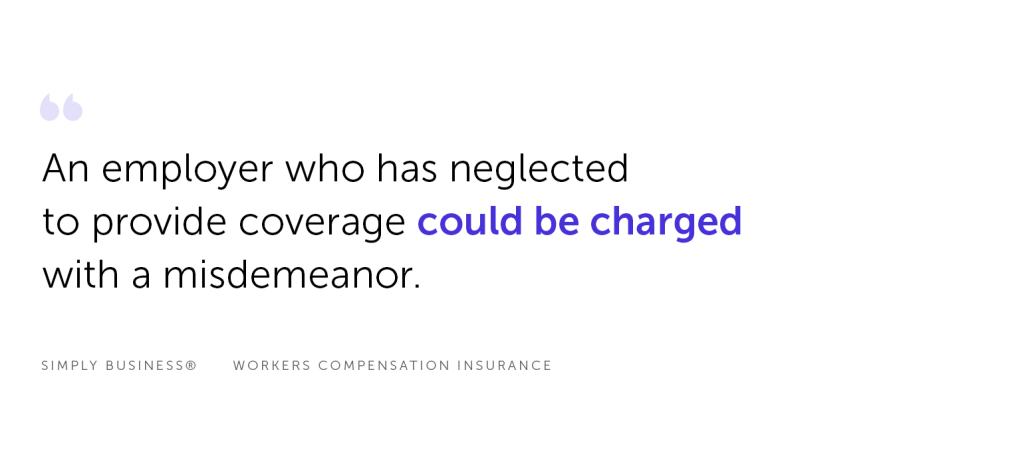North Carolina Workers’ Compensation Insurance
Our guide to workers’ compensation insurance in the Tarheel State.
Simply Business is pleased to provide tailored insurance options from:
Operating a business comes with a lot of responsibilities. One of the most important responsibilities is ensuring the safety of your employees, as well as the business itself. Maintaining a safe work environment is crucial, but no amount of preparation can completely spare you from potential accidents.
Workers’ compensation insurance is there for when those potential accidents become reality. Having a workers’ compensation insurance policy means you have coverage in the event an employee becomes injured or ill as a result of their work or workplace conditions. This could include burns, sprains, and even concussions.
Rules and requirements for workers’ comp insurance can vary between states. Be sure to read up on mandates in your state, and whether your business qualifies for them. Read on for details on workers’ compensation in North Carolina.
Does North Carolina Require Workers’ Compensation Insurance?
Different states have different workers’ comp requirements. In North Carolina, any business with at least three employees must hold a workers’ comp policy.
The following are exceptions to the requirement to hold workers’ compensation.
North Carolina self insurance workers comp
This is an option to forgo obtaining workers’ compensation insurance from an insurance company, and instead take the financial responsibility of covering claims on your own. An employer must qualify for this option by proving they are financially prepared to cover any potential claim. More information on how to qualify can be found here.
North Carolina employers of casual employees
If all employees are classified as casual, an employer does not need to carry workers’ comp insurance.This includes anyone whose employment is both casual and not in the same trade or profession as the employer.
Employers of domestic workers
If a domestic employee is employed by the household — as opposed to an agency or other service — workers’ compensation is not required.
Certain North Carolina railroads
Certain railroad employees are exempt from workers’ comp insurance in North Carolina. Details for the specific employees that are included in this exemption can be found here.
NC sawmill & logging operators
If the business saws and logs fewer than 60 days within any six consecutive months, has fewer than 10 employees, and whose primary business is not related to sawmilling and logging, the business is not required to purchase workers’ compensation insurance.
North Carolina federal employers
Workers’ compensation insurance for federal employees is carried through the U.S. Department of Labor, per the North Carolina Industrial Commission resource previously cited.
Are farms exempt from workers compensation in NC?
North Carolina agricultural businesses are required to carry workers’ comp insurance only if they have 10 or more regular, full-time employees. Businesses that sell agricultural products may be exempted, provided they are working for compensation from the producer of the products and are not the producers themselves.

Workers’ Compensation Insurance Laws in North Carolina
The primary North Carolina workers’ compensation law is the North Carolina Workers’ Compensation Act. This act establishes that any North Carolina business with three or more employees must carry workers’ compensation insurance, not including the exceptions listed above.
This workers’ compensation act is administered by the North Carolina Industrial Commission.

How Much Is Workers’ Comp Insurance in North Carolina?
As with other types of insurance, the cost of a workers’ compensation insurance policy in North Carolina depends on a variety of factors. These factors may include:
- The industry your business is in.
- The insurance company that’s writing the policy.
- The number of people employed by your business.
A licensed North Carolina workers’ compensation insurance agent will take these factors — as well as any other relevant specifics for your business — into account when quoting rates.
The coverage you elect could also impact the cost of your policy. The standard statutory limits in North Carolina are:
- $100,000 bodily injury per occurrence. This applies to any one employee.
- $100,000 bodily by disease per occurrence. This also applies to a single employee.
- $500,000 maximum total limit a carrier will pay for an employer during a single policy term.
If you choose to have higher bodily injury and disease coverage, your insurance premium will likely be higher.
North Carolina Workers’ Comp Insurance Rates
In North Carolina, employers are grouped into classifications. The classification system separates businesses by the overall risk involved in their respective industries. According to the North Carolina Department of Insurance, there are approximately 600 employer classifications in the state. These classifications impact how an employer’s workers’ compensation insurance is rated.
In general, certain industries have higher risks. While no workplace is completely free of risks, a general clerical office is less likely to put employees into harm’s way than employees who work in road construction. As a result, according to the latest data from the North Carolina Rate Bureau, their rates differ significantly. As of October 2022, for most road construction workers, the minimum premium for a policy term is $1,500, while the minimum premium for clerical office employees is up to $230 per policy term.

We’re Here to Help
Workers’ compensation insurance is an important step toward protecting your employees, as well as your business. But it can be tricky to navigate. Between confusing insurance lingo and decision fatigue, there is a lot to consider.
We have your back. We work with small businesses to make sure they have the coverage they need in order to stay protected. Start your workers’ compensation insurance quote with us today. Let’s find what works for you.

Penalty for Not Having Workers’ Compensation Insurance in North Carolina
If a business is required to have workers’ compensation insurance under the North Carolina Workers’ Compensation Act but fails to do so, the penalty can be severe.
The North Carolina Industrial Commission can fine an employer between $50 and $100 per day of lapsed coverage.
An employer who has neglected to provide coverage could be charged with a misdemeanor. One who has willfully failed to obtain coverage also can be charged with a Class H felony.
Additionally, an employer who has not provided workers’ comp coverage may be responsible for medical and other costs if there is a workplace injury claim.

North Carolina Workers’ Compensation Insurance Ghost Policy
For an employer who is the sole proprietor with no other employees, a workers’ compensation ghost policy may be beneficial. A workers’ comp insurance ghost policy covers no one, but may be used as proof of coverage for contractual reasons. This might mean a client who requires a contractor to provide proof of insurance. A ghost policy could fulfill that requirement.
In North Carolina, a common complication of ghost policies arises when the contractor subcontracts another worker. If the additional worker becomes injured, that ghost policy typically does not cover them. When setting up a ghost policy, be open with your agent and make sure that a ghost policy is best for your business’s needs.
Workers’ Comp Information in Other States
Simply Business has state information for workers’ compensation insurance in California, Colorado, Florida, Georgia, Illinois, Maryland, Minnesota, New Jersey, New York, North Carolina, Pennsylvania, Texas, Wisconsin.